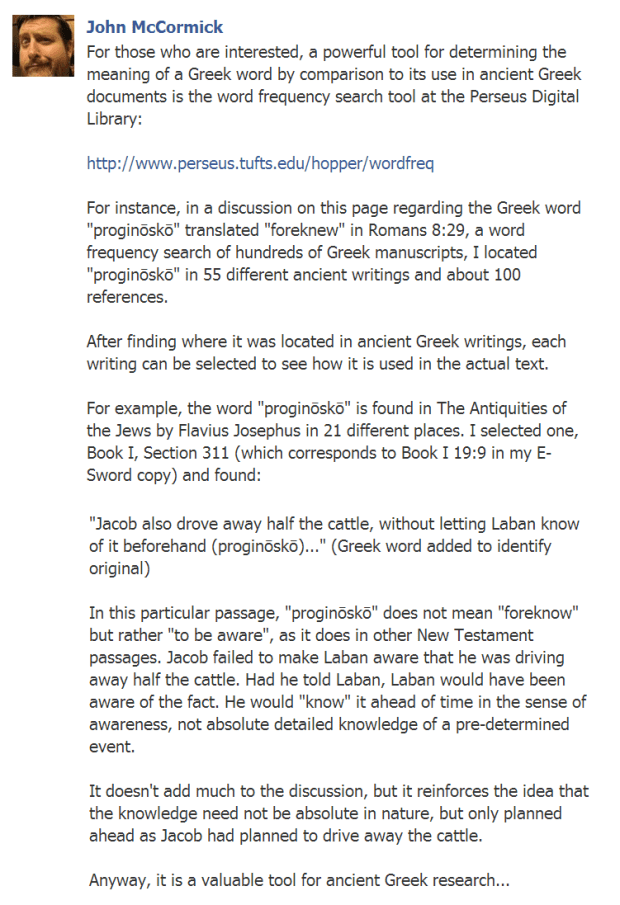Reposted from realityisnotoptional.com:
From the Contemporary Calvinist:
I find it strange that Arminians [substitute Open Theists] always focus on whether or not God actively causes men to sin. Why don’t they ever seem to be just as concerned about whether or not God actively restrains men from sinning? Wouldn’t that also be a violation of free will?
Calvinists seem to try to make this point often. If Pharaoh’s army is crossing the Red Sea and God impedes them by crashing the waves upon them from all sides, this is claimed as a “violation of free will”. Because God is killing people, he is not letting them use their “free will” to cross the Red Sea.
Contrary to what the Calvinists claim, that is absolutely not a violation of free will; free will involves overriding someone’s internal will in order to override their internal thinking. Free will is not about physical or mental constraints imposed by reality. Just because gravity exists, does not mean my “free will” to want to be weightless is overridden. My “will” to be weightless exists whether or not I can make it a reality.
To illustrate: My children have free will. They chose whether to fight amongst each other or play nicely. But when they do choose to fight, I may step in and resolve the matter. When faced with possible consequences and barriers to fighting, my children decide whether to try to defy me or back down. Defying me can be in a mental or physical aspect. Because I am about 8 times their weight, physical resistance usually is not a good choice (another plus: I never lose a “tickle” fight). Mental defiance in my children, I cannot control.
While I can never flip a switch to make my children obedient, I can help guide their mentality towards obedience. I might “break” them, as we commonly use the term. “Breaking” them involves changing their mind due to external stimulus. Only when I am able to convince them that they need to change will they actually change. I can do nothing except guide, lead, and convince.
God does this too. King Nebuchadnezzar was a great and mighty king. Daniel 4 describes an instance in which God wants to humble King Nebuchadnezzar:
Dan 4:24 this is the interpretation, O king, and this is the decree of the Most High, which has come upon my lord the king:
Dan 4:25 They shall drive you from men, your dwelling shall be with the beasts of the field, and they shall make you eat grass like oxen. They shall wet you with the dew of heaven, and seven times shall pass over you, till you know that the Most High rules in the kingdom of men, and gives it to whomever He chooses.
Dan 4:26 “And inasmuch as they gave the command to leave the stump and roots of the tree, your kingdom shall be assured to you, after you come to know that Heaven rules.
God cannot just override Nebuchadnezzar’s will. It would be infinitely easier for God to just “enforce” His will by overriding human will. God need not “flood the Egyptians” (Exo 14), “make Zacharias mute” (Luk 1), or “send lying spirits to convince false prophets” (1Ki 22). If God overrode wills, God could just “make the Egyptians decide to turn around”, “make Zacharias name his son John”, and “make Ahab decide to go to battle”. But the Bible does not describe this. God instead uses his resources to physically and mentally stop and manipulate people. God plagues Nebuchadnezzar both physically and mentally, turns him into a psychotic beast, in order to make him humble. This works, and Nebuchadnezzar is much more humble than before the humiliation.
This is in contrast to a robot. A robot has no free will. It is every programmer’s dream to even simulate free will. A robot cannot truly choose to perform an action. Instead, every decision is determined by coding. Even computer generated “random” number are not truly random numbers, but instead determined by complex formulas. Computers, even if not physically or mentally restrained, do not have free will.
Free will is not constrained by physical and mental impediments. Free will is our internal decisions, apart from physical and mental capabilities or limitations. When Calvinists see God killing someone as “limiting that person’s will” we should correct them. God impedes individuals, but nowhere in the Bible “limits their will”.




